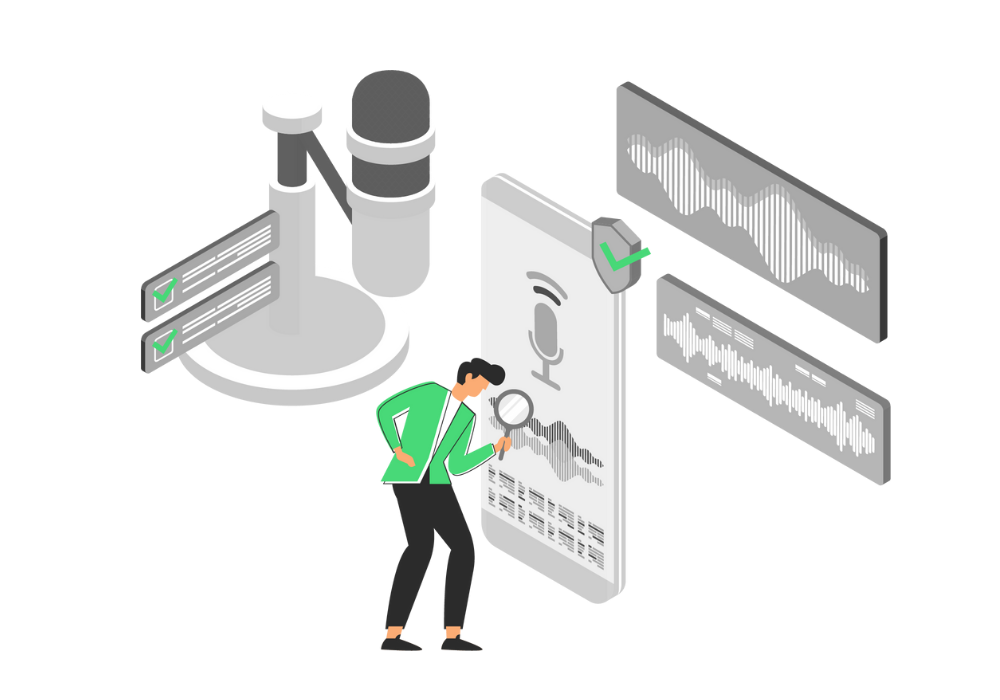What is Voice Search?
Voice searches are queries we can make verbally through a device, either searching online or locally on the device itself.
Voice search is not just a trend from 2022. This functionality, which began as a way to dictate words and phrases, gradually became a convenience that saves us time—not only on mobile devices but on any digital gadget.
Voice Search Data
It’s no coincidence that Business Wire reported sales of 150 million voice assistants worldwide in 2020, the most well-known being Alexa, Siri, Google Nest, and Cortana. In that same year, the number of households with a smart speaker had risen to 50% of broadband-connected homes. As a result, most devices are now fully optimized for voice search.
According to Google, 27% of the population uses voice search, while 58% of consumers use it to find local information. Currently, about 31% of mobile users worldwide use voice search more than once a week. Of these, more than half are under 18 years old—true digital natives. But it’s not just numbers: Google has analyzed voice searches and found that their accuracy reaches 95%.
What Do People Search for by Voice, and How?
Think of voice searches you’ve made recently: “What movies are playing this weekend?”, “What time does the new Italian restaurant in the neighborhood open?”, or “Emergency locksmiths 24h”. Maybe even “Is ‘murciélago’ the only Spanish word containing all five vowels?”, “Latest news about the situation in Ukraine”, or “How to make ingredients for a special recipe”.
We can categorize these searches into two main types:
- Informational
- Local
Often, these two types are combined. Previously, we carefully dictated text to avoid transcription errors, but technology and AI in these systems have improved so much that we can now speak to voice assistants as if they were people.
Therefore, natural language is a key aspect of voice search. Businesses analyzing organic and paid search traffic will notice an increase in keywords containing phrases like: “what is”, “how to”, or “near me”. Additionally, since almost all voice searches occur on personal devices, this provides an accurate understanding of users’ profiles, interests, needs, and location.
How Can Voice Search Impact Your Business?
SEO and SEM are the two digital disciplines most influenced by voice search. How can we leverage this growing trend and convert that traffic into business?
Optimize for these searches. Voice queries differ from typed searches, even if semantically they mean the same. Voice searches are typically longer, more informal, more idiomatic, and more conversational.
How to optimize content for voice search? Use question formats, which are common in voice searches. For example, create a robust FAQ page that answers questions about your services. For products, transform information pages: e.g., turn a “size guide” into “how to calculate my size.” The goal is not just to rank content, but to generate business:
- A blog can publish user guides and tutorials using frequently searched terms: what is, how to, why, which. A satisfied user is more likely to become a customer.
- A product page can answer questions that may stop a user from purchasing: size guides, chat (real-time or automated), maintenance instructions, usage suggestions, etc.
- A well-structured FAQ builds much more trust than making users manually search for return policies, for example.
The impact on campaigns is more subtle. We’ve observed the steady growth of these searches in query reports. It may be useful to redirect informational searches to content pages, while transactional keywords go to conversion-focused landing pages. You could also exclude some voice search traffic, but do you really want to, knowing this trend is here to stay and grow? Make the most of it.
Voice search is also crucial for promoting local businesses. Keywords like “service + near me” are essential in any local campaign.
Need to improve your SEO or local campaigns? Request a quote and we’ll help you make the most of voice search.



